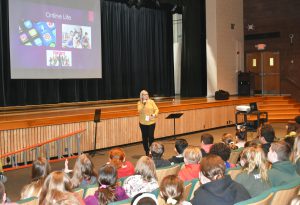Minisink Valley Middle School’s ongoing character education programming continued with a Jan. 27 presentation to sixth-graders on Internet safety and cyberbullying.
 Alexa Benincasa, representing the New York State Department of Criminal Justice in Albany, spoke to students about how to be online and be safe while having fun.
Alexa Benincasa, representing the New York State Department of Criminal Justice in Albany, spoke to students about how to be online and be safe while having fun.
Students definitely know about many social media networks
A show of hands revealed just about every student in the auditorium was more than savvy about using Snapchat, Instagram, YouTube and latest — TikTok, a social network where users share videos covering a wide range of categories, from lip syncing to comedic skits to viral challenges.
That’s in addition to online video game usage, but not necessarily Facebook, which tends to be used by older people.
Ms. Benincasa stressed using them required students to be knowledgeable about safeguards, the need to make the right choices and always being responsible while online.
“Something you post or do online will affect you in the future,” she cautioned students.
‘Privacy is not guaranteed online.’
Ms. Benincasa reminded students about the importance of not giving out names, addresses or any information about one’s family; not sharing passwords or posting photos of one’s self without parental permission; not talking to strangers online; and if anyone online makes them feel uncomfortable, stopping it and immediately telling an adult.
 “Privacy is not guaranteed online,” she said, encouraging students to have a different password for each of their accounts and don’t share passwords with friends; use privacy settings; remember who one “friends;” limit access to location; and don’t share the personal information of others.
“Privacy is not guaranteed online,” she said, encouraging students to have a different password for each of their accounts and don’t share passwords with friends; use privacy settings; remember who one “friends;” limit access to location; and don’t share the personal information of others.
She offered specific tips to safeguard privacy on Snapchat and/or Instagram, including: don’t add unknown people as followers; keep locations in “ghost mode;” use privacy settings; be honest about one’s age; block anyone who sends inappropriate messages; control comments to be seen/read; and report any bullying or harassment.
Stay away from any risky behaviors
Ms. Benincasa warned students about risky behaviors: Don’t send mean, hurtful or rude messages; don’t share photos online or via text messaging; and don’t talk about inappropriate or adult subjects with strangers. She stressed doing so could possibly have negative, long-term consequences college or work, and cause short-term issues in school or with the law.
She asked them to consider: “Would the adults in my life think this is appropriate?”
‘If you see something, say something.’
Ms. Benincasa also spoke about the negative consequences of cyberbullying, and how students may be able to tell of another student is being subjected to it.
“If you see something, say something,” she said. “Don’t participate just to fit in. Stand up for the victim and report the cyberbullying. Keep critical comments to yourself. Don’t forward rumors or embarrassing photos. Don’t comment on insulting or harassing posts. Treat others with respect.”
Principal Michael Larsen encouraged students to give serious thought about the information presented.
“Take the material and reflect on it,” he said. “We want you to make good choices.”
